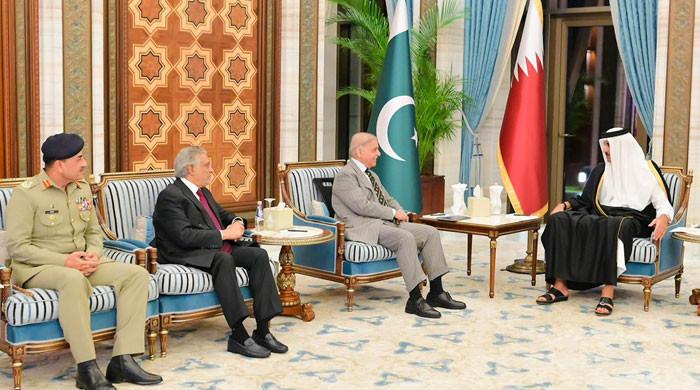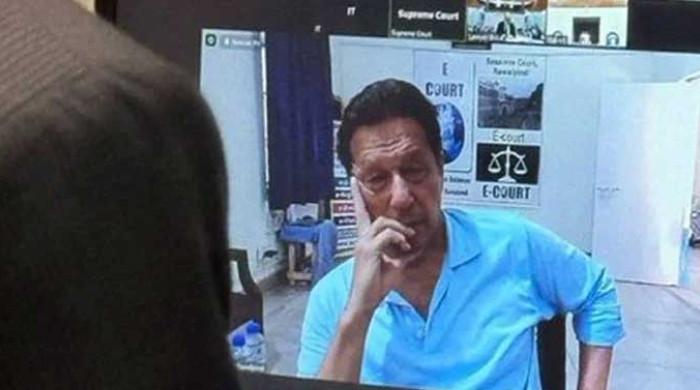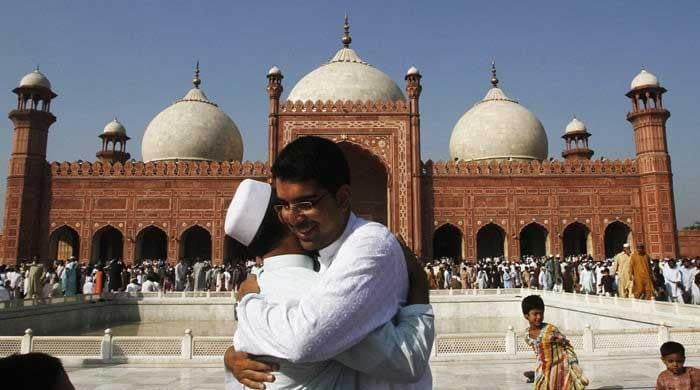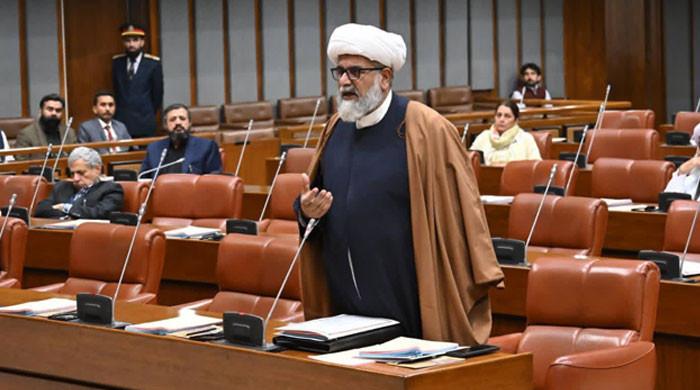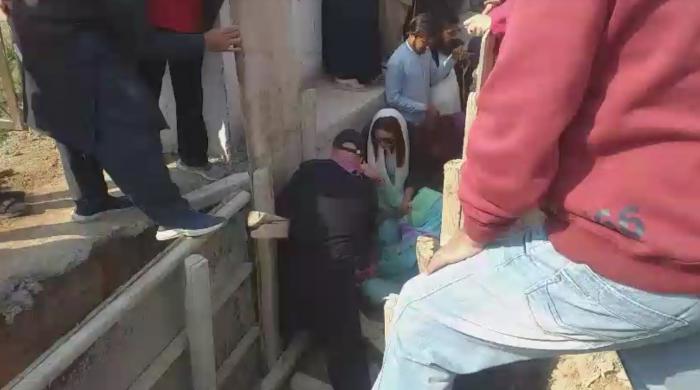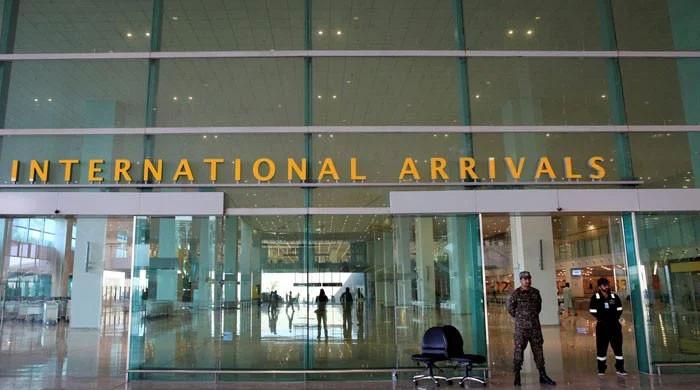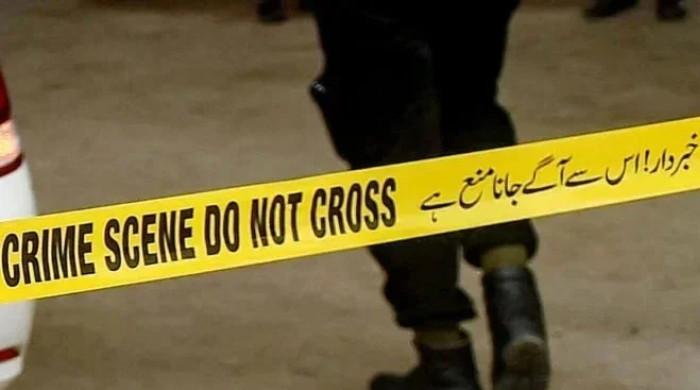At UNGA, PM says Pakistan seeks peace in 'our part of world' after defeating India
"This is my most sincere and serious offer before this assembly of the world nations," says Premier Shehbaz
September 26, 2025
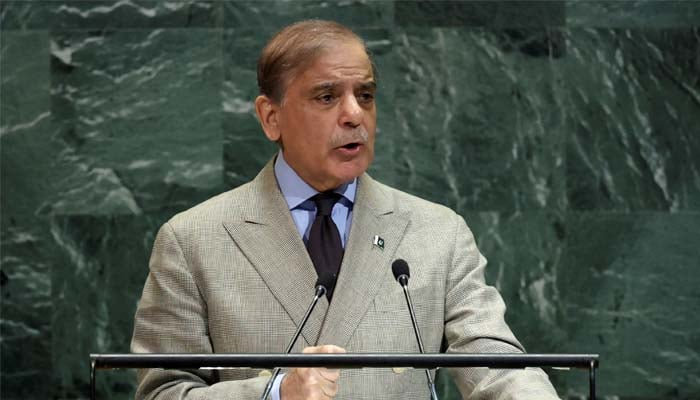
- Pakistan sent back 'enemy' India with bloody nose: PM.
- Ready for dialogue with India on all outstanding issues: PM.
- PM Shehbaz slams Israel’s genocidal onslaught in Gaza.
Prime Minister Shehbaz Sharif told the United Nations General Assembly (UNGA) that Pakistan sought peace in the region after it delivered a “bloody nose” to India in the May conflict.
“We have won the war, and now we seek to win peace in our part of the world, and this is my most sincere and serious offer before this assembly of the world nations,” the prime minister said at the August forum in New York.
Pakistan and India engaged in a four-day fight — their worst in decades — after New Delhi’s unprovoked assault on Islamabad following a terrorist attack in Indian Illegally Occupied Jammu and Kashmir. India blames Pakistan for the attack, a charge that Islamabad has vehemently denied.
"Last year, from this very podium, I had warned that Pakistan would act — and act most decisively — against any external aggression. Those words of mine proved true. I hoped they would not. But then, that is destiny," the prime minister stressed.
In May this year, he recalled, "My country confronted unprovoked aggression from our eastern front. The enemy came shrouded in arrogance; we sent them back in humiliation, delivering a bloody nose".
“India sought to extract political gains from a human tragedy by spurning my sincere offer of an independent international investigation into the Pahalgam incident,” he said.
The prime minister added that instead, New Delhi attacked Pakistani cities and targeted innocent citizens. “When our territorial integrity and national security were violated, our response was in accordance with the right of self-defence under Article 51 of the UN Charter.”
Sought peace despite upper hand
The premier said that Pakistan’s valiant armed forces, under the leadership of Field Marshal Asim Munir, mounted an operation of stunning professionalism and bravery, repulsing the enemy’s attack under the air chief marshal.
“Our falcons took flight and etched their answer across the skies, resulting in seven of the Indian jets turning to scrap and dust — a decisive response. A response to the aggressor that will echo through the annals of history.”
“To the fair architect of this victory, to every officer and soldier, heirs of our martyrs — their names are forever engraved in glory,” he said.
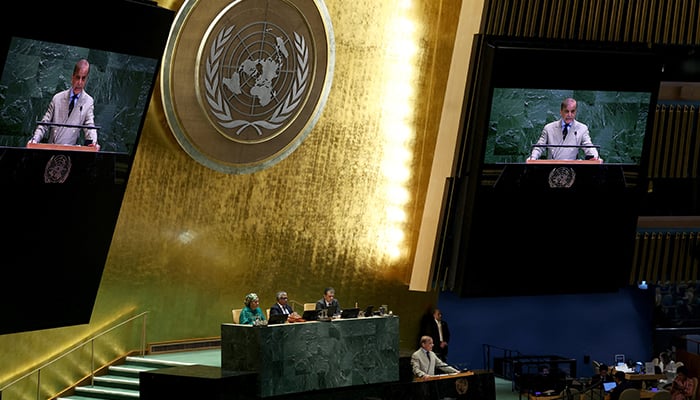
“The mothers of our martyrs — their courage guides our path forward, and their sacrifice shall never be in vain, God willing. And to every Pakistani, you stood as one unbreakable wall — Bunyanum Marsoos,” he added.
Though in a position of strength, he stressed, Pakistan agreed to a ceasefire facilitated by President Trump’s bold and vigorous leadership. He expressed deep appreciation to him and his team for their active role in bringing about the ceasefire.
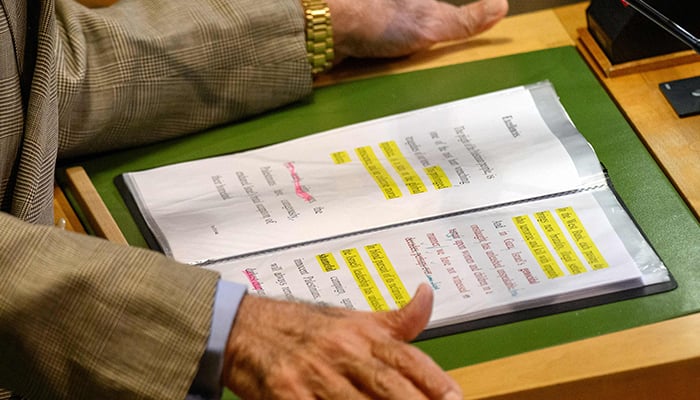
He added that Trump’s efforts for peace helped avert a more threatening war in South Asia. Had he not intervened timely and decisively, the consequences of a full-fledged war would have been catastrophic.
“Who would have lived to tell what happened? And therefore, in recognition of Trump’s wonderful and outstanding contribution to promoting peace in our part of the world, Pakistan nominated him for the Nobel Peace Prize. I think this is the least we can do for his love of peace — truly, he is a man of peace.”
'Result-oriented dialogue with India'
While India remains adamant on maintaining a hard-line stance against Pakistan, the prime minister yet again sought talks with the eastern neighbour "all outstanding issues".
“Pakistan stands ready for a composite, comprehensive, and result-oriented dialogue with Indian on all outstanding issues," the prime minister said.
The premier mentioned that South Asia requires proactive rather than provocative leadership and that India’s unilateral and illegal attempt to hold the Indus Water Treaty in abeyance defies the provisions of the treaty itself as well as the norms of international law.
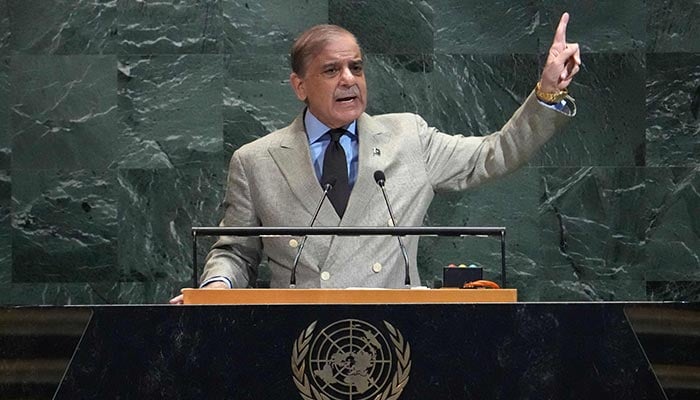
“Pakistan has made it abundantly clear and led there be no doubt once again in anybody's mind, as I said last year in this hall from this podium, we will definitely defend the inseparable right of our 240 million people on these waters. To us, any violation of this IWT represents an act of war.”
“Through this house, I wish to assure the Kashmiris that I stand with them, the people of Pakistan stand with them, and one day soon India’s tyranny in Kashmir will come to a grinding halt, Kashmir will gain its fundamental right to self-determination through an impartial plebiscite under the auspices of this very organisation, the UN.”
Israel's 'unspeakable terror'
In his speech earlier, the prime minister noted that the world is more complex than ever before: conflicts are intensifying, international laws are being brazenly violated, humanitarian crises are multiplying, terrorism remains a potent threat, disinformation and fake news undermine trust, and climate change threatens our very survival — particularly in countries like Pakistan.
“Today, multilateralism is no longer an option; it is the need of the hour. Pakistan's foreign policy, guided by Quaid-i-Azam, is based on peace, mutual respect, and cooperation. We believe in the peaceful settlement of disputes through dialogue and diplomacy,” he said.
Later, while highlighting the Palestine issue, he said that the plight of the Palestinian people is one of the most heart-wrenching tragedies of our times.
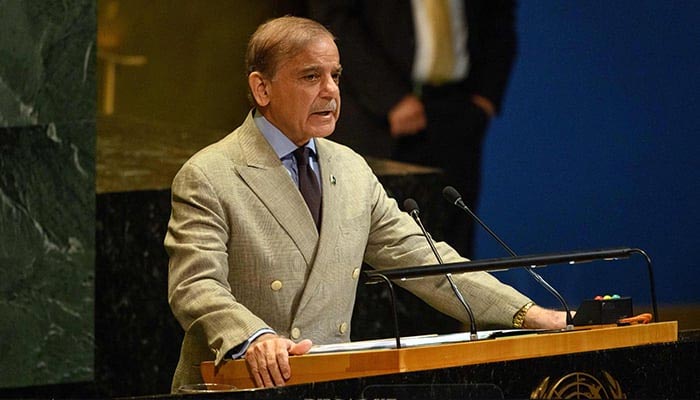
“This prolonged injustice is a stain on the global conscience and our collective moral failure. For nearly 80 years, the Palestinians have courageously endured Israel's brutal occupation of their homeland in the West Bank, with each passing day bringing new brutality, illegal settlers who terrorise and kill with impunity, and nobody can challenge them or question them.”
And in Gaza, he noted, Israel's genocidal onslaught has unleashed unspeakable terror upon women and children in a manner not witnessed in the annals of history.
In blind pursuit of its nefarious goals, the prime minister said, the Israeli leadership has unleashed a shameful campaign against innocent Palestinians which history will always remember as one of its darkest chapters.
'We must speak loud and clear'
Despite Israel’s relentless onslaught and support from its allies, the prime minister said, “But speak we must, and speak loud and clear.”
“Our words are too little and too late for a child, Hind Rajab. We have all heard a trembling voice, a phone call that little Hind made as she struggled to stay alive under the Israeli onslaught and atrocities,” he lamented.
“My agony, the agony of the entire Muslim Ummah and of all nations, that we failed Hind Rajab. And she will not forget us in this world or the hereafter. As they say, the smallest coffins are the heaviest to carry.”
The prime minister recalled that he, too, carried the coffin of a child, Irtiza Abbas, during the recent confrontation with India.
“Therefore, we must not and cannot fail the children of Gaza or any child anywhere in the world. We must find a path to a ceasefire now — and just now.”
Pakistan firmly supports the demand of the Palestinian people for the establishment of a sovereign state with pre-1967 borders and Al-Quds Sharif as its capital, he added.
“Palestine can no longer remain under Israeli shackles; it must be liberated and liberated with full commitment and force.”
As Pakistan is concerned, he added, it was among the first to recognise Palestinian statehood in 1988. “Now, we welcome [the recognition] of the state of Palestine by a number of countries and [we] urge others to follow suit, because time and tied waits for none.”
Israel’s recent attack on Doha and its continued violation of the sovereignty and territorial integrity of numerous countries are reflective of its rogue behaviour.
“Pakistan stands unwavering with our brothers and sisters of Qatar. We also support all efforts of a peaceful resolution of the Ukraine conflict in line with the UN charter to end human suffering and global turmoil caused by this war,” he said.
Pakistan’s fight against terror
“Pakistan condemns terrorism in all its forms and manifestations. For over two decades, Pakistan has been at the front line of global counter-terrorism efforts,” he said.
The prime minister added that Pakistan has lost 90,000 people — babies, children, mothers, sisters, brothers, elderly people, doctors, engineers — and also suffered an economic loss of $150 billion.
“Please tell me, with a hand on your heart, what can be a bigger manifestation of our commitment to fight terrorism and erase it not only from Pakistan but from the face of the world?”
“I believe a man killed in New York is a man killed in Lahore, and a man killed in Islamabad is a man killed in London. It’s a global village, and unless and until terrorism is defeated hands down, this world will not be a peaceful place to live. For that, Pakistan's sacrifices are probably the greatest around the globe.”
Pakistan must be respected and appreciated because it is a bulwark, he said, noting that had these terrorists not been confronted by us, they would have been roaming the streets of New York and London.
“I think this is our humble contribution not only for the people of Pakistan but for the people all over the world.”
“Today,” he said, “we face externally sponsored terrorism, particularly from foreign-funded groups such as the banned Tehreek-e-Taliban Pakistan, Fitna al-Hindustan, BLA and its Majeed Brigade operating from Afghan soil. These groups are responsible for some of the most heinous attacks inside Pakistan, including the Jaffar Express incident earlier this year, when the train was hijacked and 400 people were kept hostage for days and weeks. Our armed forces and LEAs were able to recover them.”
Afghanistan and regional stability
As an immediate neighbour and brotherly country, he said, Afghanistan is of direct concern to Pakistan.
“We believe that the key to development and prosperity lies in regional stability and connectivity. Pakistan continues to engage with all partners to extend humanitarian assistance, promote economic recovery, and encourage an inclusive political framework in Afghanistan.”
The Afghan government must, however, uphold human rights, including women’s rights.
“Above all, we expect the Afghan government to take effective action against terrorist groups and ensure that Afghan soil is not used for terrorism against any country.”
“There must be no space for hate speech, discrimination, and violence against any person or any religion. Hate-driven ideologies, such as India’s Hindutva-driven extremism, pose a danger to the entire world.”
“While there is growing recognition of the dangers of Islamophobia, the imperative of effectively combating this menace can hardly be overemphasised. Pakistan welcomes the appointment of a UN special envoy to combat this scourge.”
Climate battle ‘not fair play’
The prime minister also drew the UNGA’s attention to the climate crisis. “While we are confronted with a climate crisis, it demands the most urgent collective action.”
In 2022, he said, Pakistan faced massive floods of humongous proportions that caused losses amounting to $34 billion, with many valuable lives lost.
This year again, he said, the South Asian nation is dealing with another mega flood, with thousands of villages wiped off the face of the earth.
He added that millions of people have been displaced, more than 1,000 killed, and billions of dollars worth of crops, livestock, and property destroyed — lost to floodwaters.
The nation, the prime minister said, stands united in these pressing times, and it is dealing with this national calamity with remarkable resilience and with the grace of God.
“I have declared a climate emergency to cope with this challenge. The catastrophic floods of 2022 and 2025 are clear examples of loss and damage due to climate change.”
Pakistan, on the contrary, contributes less than 1% of global emissions annually.
“Yet, it continues to face the relentless brunt and muddy waves of climate change, and then we are told to get loans and add to our huge debt — the pillars we have built over time. This is not fairness, this is not equality, this is not justice, this is not fair play.”
“How can you expect a developing country, facing humongous floods every year due to climate change through no fault of ours, to keep borrowing more loans?” he said.
The prime minister added that borrowing more would destroy Pakistan’s economy. “We will be better off not borrowing loans, but standing on our own feet, working hard tirelessly with blood and sweat. We will make Pakistan a great country.”
At the end, he said: “Let me assure you that Pakistan will always stand for peace, justice, and development — for a revitalised UN and for cooperative multilateralism that is fair, inclusive, and delivers for all.
“Therefore, let this 80th anniversary not simply commemorate history; let us make history and chart a future for the next 80 years, with the UN as an enduring hope for global good. Let us truly strive to become better together.”




